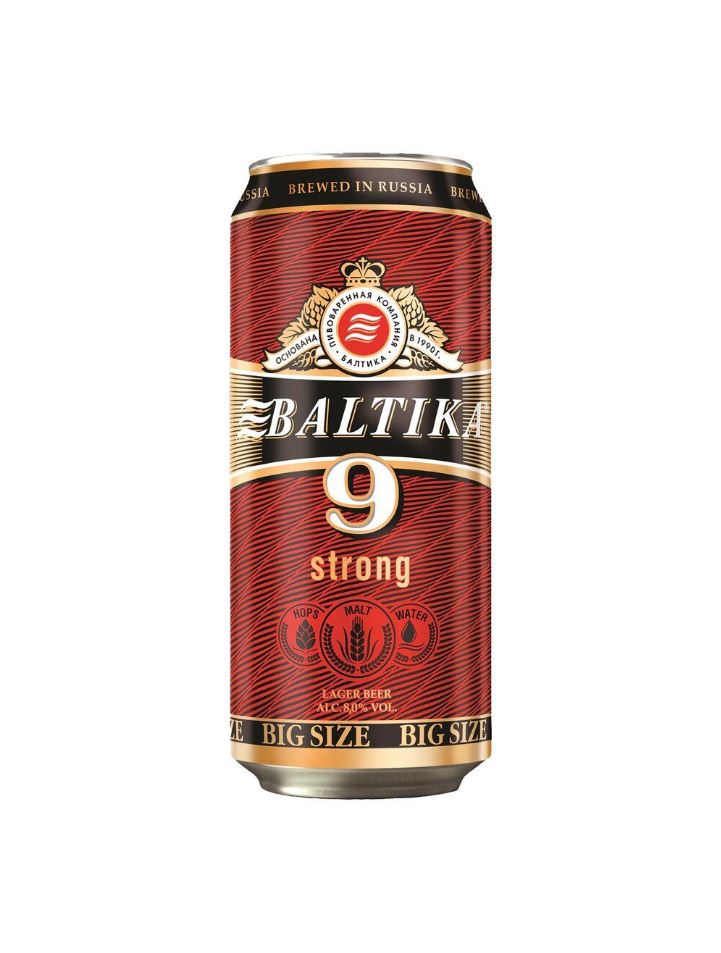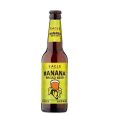Baltika Breweries, a distinguished name in the brewing industry, stands as one of Europe’s leading beer producers. Established in St. Petersburg, Russia, Baltika Beer has become synonymous with quality and innovation within the competitive landscape of the beverage market. As the flagship product of the Baltika Breweries, Baltika Beer has carved out a significant presence not only within its native Russia but also on the global stage, making it a key player in the industry.
Headquartered in the historic and culturally rich city of St. Petersburg, Baltika Breweries operates under the umbrella of the Carlsberg Group, one of the world’s largest brewing entities. This strategic positioning benefits the brand immensely, providing it with access to extensive resources and a vast distribution network. As a result, Baltika Beer enjoys a dominant position in the Russian market, holding over 38% market share. This impressive market penetration underscores the brand’s strong connection with its consumer base and its ability to cater to a diverse range of tastes and preferences.
The success of Baltika Beer is rooted in its commitment to quality and its continuous pursuit of innovation. The brewery has developed a wide array of beers, each tailored to different segments of the market, from casual consumers to connoisseurs. The company’s dedication to excellence is evident in its brewing processes, which combine traditional methods with modern technology, ensuring every bottle of Baltika Beer meets the high standards expected by its customers.
Furthermore, Baltika Breweries has demonstrated remarkable resilience and adaptability in navigating the complexities of the Russian and international beer markets. Despite challenges such as political changes and economic fluctuations, the brand has maintained its leadership position, testament to its robust business model and the enduring appeal of Baltika Beer. As it continues to expand its reach and innovate its offerings, Baltika Breweries remains a beacon of quality and success in the global brewing industry.
| Aspect | Details |
|---|---|
| Founding and Location | Established in St. Petersburg, Russia, Baltika Breweries is a leading beer producer under the Carlsberg Group umbrella. |
| Market Presence | Holds a dominant position in the Russian market with over 38% market share, illustrating strong consumer connection and broad market penetration. |
| Product Range and Innovation | Offers a diverse array of beers catering to varying tastes, from casual drinkers to beer connoisseurs. Focuses on combining traditional brewing methods with modern technology. |
| Challenges and Resilience | Has navigated through political and economic challenges in both Russian and international markets, maintaining leadership and demonstrating robust adaptability. |
| Global Impact | Part of the Carlsberg Group, benefiting from extensive resources and a vast distribution network, enhancing its global presence and competitiveness. |
Contents
History and Development
Baltika Breweries was founded in 1990 by Naif Achakzai and Nikita Kefirov, marking the onset of a transformative era in the Russian brewing industry. Established in the wake of the Soviet Union’s dissolution, Baltika began as a small operation but quickly ascended to prominence. By 1992, amidst the seismic shifts of Russia’s transition to a market economy, the brewery was privatized. This pivotal move allowed for significant capital infusion and set the stage for a series of expansions that would define its trajectory.
The privatization of Baltika opened the doors to a raft of investments, enhancing its brewing capabilities and technological base. In 1993, a major development occurred when the Baltic Beverages Holding (BBH) Brewing Concern acquired a significant stake in the company, becoming its largest shareholder. This partnership was instrumental in modernizing operations and expanding production capacity. By 1998, the company was rebranded as the Open Joint Stock Company Baltika Breweries, reflecting its evolving business structure.

In the year 2000, a landmark development was the opening of the largest Soufflet Malting Plant in Russia, built in St. Petersburg in collaboration with France’s Groupe Soufflet. This not only underscored Baltika’s commitment to using high-quality ingredients but also demonstrated its growing influence in the brewing industry. September 2001 marked another major milestone when Baltika listed on the RTS stock exchange, achieving a market capitalization of $1.3 billion by January 2002. This listing was a testament to its market dominance and investor confidence.
The subsequent years saw Baltika engaging in a series of strategic mergers and acquisitions. In 2006, the brewery merged with three other Russian breweries—Vena, Pikra, and Yarpivo—and by 2007, these entities were consolidated into one legal entity under the Baltika brand. This expansion was not just geographical but also involved diversifying the product range and integrating various aspects of the beer production supply chain.
| Year/Period | Event | Impact |
|---|---|---|
| 1990 | Founding of Baltika Breweries by Naif Achakzai and Nikita Kefirov. | Marked the beginning of a new era in the Russian brewing industry, establishing a small operation that quickly gained prominence. |
| 1992 | Privatization of Baltika Breweries. | Enabled significant capital infusion and expansion, setting the stage for future growth and modernization. |
| 1993 | Baltic Beverages Holding (BBH) acquired a significant stake, becoming the largest shareholder. | Instrumental in modernizing operations and expanding production capacity, integrating advanced brewing technologies. |
| 1998 | Rebranding as the Open Joint Stock Company Baltika Breweries. | Reflected the evolving business structure and market strategy of the company. |
| 2000 | Opening of the largest Soufflet Malting Plant in Russia in collaboration with France’s Groupe Soufflet. | Enhanced the quality of ingredients used in brewing, showcasing a commitment to high standards and industry influence. |
| 2001-2002 | Listing on the RTS stock exchange and achieving a market capitalization of $1.3 billion by January 2002. | Demonstrated market dominance and investor confidence in Baltika’s growth and strategic direction. |
| 2006-2007 | Merging with Vena, Pikra, and Yarpivo breweries and consolidation into one legal entity under the Baltika brand. | Expanded geographical reach and product range, integrating various aspects of the beer production supply chain. |
Operation and Production
Baltika Breweries has established itself as a powerhouse in beer production with a capacity exceeding 52 million decaliters per month. It owns more than 30 beer brands and several non-beer brands, catering to a diverse palette ranging from traditional lagers to craft beers and innovative non-alcoholic drinks. The company’s product lineup is continually evolving, with new additions that reflect current consumer trends and preferences.
The strategic location of Baltika’s production facilities plays a crucial role in its operational success. With breweries in St. Petersburg, Moscow, Yaroslavl, Rostov, Samara, Tula, and Khabarovsk, as well as international sites, Baltika is able to efficiently serve a vast market. These locations are not randomly chosen; they are integral to logistical strategies that optimize distribution channels and minimize transportation costs, ensuring that fresh beer reaches consumers quickly and efficiently.

Innovation has been a cornerstone of Baltika’s operational strategy. The brewery has been at the forefront of adopting new brewing technologies and techniques, enhancing both the quality and variety of its products. One of the notable innovations was the introduction of a new malting technique that significantly improves the flavor profile of the beer. Baltika has also embraced sustainable practices, incorporating energy-efficient technologies and waste reduction measures that align with global environmental standards.
Moreover, Baltika’s commitment to innovation is reflected in its product development. The brewery has introduced a range of new products in recent years, including specialty beers that cater to niche markets and seasonal offerings that keep the brand relevant and engaging. This approach not only broadens its market appeal but also fosters a deeper connection with consumers who look for variety and quality in their beer choices.
In summary, Baltika Breweries’ journey from a modest startup to a leading force in the brewing industry is a testament to its strategic vision and adaptability. Through significant milestones in its development, strategic expansion, and a commitment to innovation, Baltika has established a robust operational foundation that continues to drive its success in the competitive brewing sector.
| Aspect | Details |
|---|---|
| Production Capacity and Brands | Baltika Breweries produces over 52 million decaliters per month and owns more than 30 beer brands along with several non-beer brands, covering a broad spectrum from traditional lagers to innovative non-alcoholic beverages. |
| Strategic Facility Locations | Operates breweries in key Russian cities and internationally, optimizing logistical efficiencies, reducing transportation costs, and ensuring freshness and availability of products across vast markets. |
| Innovation and Sustainability | Emphasizes adopting advanced brewing technologies and sustainable practices. Innovations include new malting techniques and environmental initiatives like energy efficiency and waste reduction. |
| Product Development | Continuously evolves its product lineup with new offerings such as specialty beers and seasonal variants to meet current consumer trends and preferences, enhancing market appeal and consumer engagement. |
Brand Portfolio
Baltika Breweries boasts an extensive and diverse portfolio that includes a wide range of beer and non-beer brands, catering to a variety of tastes and preferences. The brand portfolio strategically balances traditional Russian beers with international brands and innovative new products, thereby maintaining a strong market presence and appealing to a broad demographic.
Among the internationally recognized brands under the Baltika umbrella are Tuborg, Holsten, and Kronenbourg 1664. Tuborg, originally a Danish brand, has been a popular choice in Russia since Baltika began its production under license in 2000. Known for its crisp and refreshing taste, Tuborg offers several varieties including Tuborg Green, Black, Gold, and the newer additions Tuborg Raw and Tuborg Ice Draft. Holsten, a German brand also produced under license by Baltika, has established a strong following with its premium and light versions, appealing to consumers who prefer traditional German brews.

Kronenbourg 1664, another significant brand in Baltika’s portfolio, is renowned for its refined flavor and quality. Introduced to the Russian market in 2004, it has gained popularity not only for its classic lager but also for its innovative variants like Kronenbourg 1664 Blanc and Blanc Rose, which offer a modern twist on the traditional lager experience.
In addition to these global giants, Baltika has been successful in developing and promoting regional brands that resonate with local tastes and preferences. These include “Yarpivo”, “Nevskoye”, and “Baltika Numbered Series”, each tailored to different segments of the Russian market. These brands have allowed Baltika to maintain a deep connection with Russian consumers, reflecting regional brewing traditions and consumer trends.
| Brand | Origin | Description | Market Impact |
|---|---|---|---|
| Tuborg | Denmark | Produced under license since 2000, known for its crisp and refreshing taste. Variants include Tuborg Green, Black, Gold, Raw, and Ice Draft. | Popular choice in Russia, appealing to younger demographics and those looking for versatile drinking options. |
| Holsten | Germany | Produced under license, available in premium and light versions, known for its traditional German brew quality. | Has established a strong following in Russia, especially among consumers who prefer authentic German beer flavors. |
| Kronenbourg 1664 | France | Introduced in 2004, offers classic lager and innovative variants like Blanc and Blanc Rose. | Has gained popularity for its refined flavor and quality, appealing to premium beer consumers. |
| Yarpivo | Russia | A regional brand that caters to local tastes, available in various styles to suit different consumer preferences. | Resonates with Russian consumers, reflecting regional brewing traditions and maintaining a strong local connection. |
| Nevskoye | Russia | Another regional brand popular in specific areas, offering traditional Russian beer flavors. | Helps Baltika maintain a diverse portfolio that appeals to a wide demographic within the country. |
| Baltika Numbered Series | Russia | A series of beers each numbered and differentiated by style and taste, covering a broad range of flavors and strengths. | Enables Baltika to cater to varied taste preferences, solidifying its market dominance across Russia. |
Market Presence and Sales
Baltika’s strategic brand portfolio has not only fortified its domestic leadership but also bolstered its presence in the international market. In Russia, Baltika continues to hold a commanding share of over 38%, a testament to its strong branding, extensive distribution network, and diverse product range. This dominant market position is maintained through consistent quality, innovative marketing strategies, and regular product launches that keep the brand dynamic and relevant.
Internationally, Baltika has made significant inroads, exporting to over 75 countries across Western Europe, North America, and the Asia-Pacific region. While international sales constitute a smaller fraction of total volume, they represent a growing segment thanks to a rising interest in unique and authentic Russian brews abroad. Baltika’s strategic export initiatives have targeted markets with a high demand for premium and specialty beers, leveraging the brewery’s reputation for quality and innovation.
The sales performance of Baltika Breweries over recent years highlights the impact of strategic decisions on revenue and profitability. Despite challenges such as fluctuating market conditions and regulatory changes, the company has managed to sustain its growth trajectory. This resilience can be attributed to its adaptive market strategies, which include diversifying the product lineup and expanding into new markets. Moreover, special editions and seasonal brews have played a crucial role in attracting new customers and retaining interest among existing ones.
The introduction of non-alcoholic versions of popular brands, such as the Kronenbourg 1664 Blanc Alcohol Free, caters to the growing segment of health-conscious consumers and reflects Baltika’s ability to respond to market trends. Similarly, the company’s investment in marketing and brand promotions has effectively enhanced brand visibility and bolstered consumer engagement.
In conclusion, Baltika Breweries’ extensive brand portfolio and strategic market presence have been pivotal in its success. By balancing a mix of internationally recognized brands with a strong lineup of regional favorites and continuously innovating its offerings, Baltika has effectively catered to a wide range of consumer preferences, both in Russia and internationally. The company’s robust sales figures and market penetration are indicative of its strategic acumen and its ability to adapt to both market trends and consumer demands.
| Aspect | Domestic Market | International Market |
|---|---|---|
| Market Share and Brand Strength | Holds over 38% market share in Russia, maintained through strong branding, diverse product range, and consistent quality. | Exports to over 75 countries, focusing on premium and specialty beers to tap into markets with high demand for unique Russian brews. |
| Strategic Initiatives | Regular product launches, innovative marketing strategies, and a focus on maintaining dynamic and relevant offerings. | Targeted export initiatives leverage Baltika’s reputation for quality; strategic marketing enhances global brand visibility. |
| Product Diversification | Introduction of new flavors, special editions, and seasonal brews helps sustain interest and attract new consumers. | Non-alcoholic versions like Kronenbourg 1664 Blanc Alcohol Free cater to health-conscious consumers internationally. |
| Sales Performance and Growth | Despite fluctuating conditions and regulatory changes, sustained growth through adaptive market strategies. | While a smaller fraction of total volume, international sales are growing, driven by strategic market entry and product innovation. |
Challenges and Controversies
The challenges facing Baltika Breweries have been significantly shaped by the geopolitical tensions arising from the Russian invasion of Ukraine. This conflict has had profound implications for businesses operating within and outside of Russia, with Baltika at the forefront due to its prominence in the brewing industry. The initial reaction from the international community included widespread sanctions and business withdrawals from Russia, impacting companies like Carlsberg, the parent company of Baltika.

In an attempt to dissociate from the political backlash and mitigate the risks, Carlsberg sought to sell Baltika. However, these efforts were thwarted in July 2023 when the Russian government seized control of the company under the pretext of safeguarding national interests, citing regulations concerning entities from “unfriendly countries.” This government intervention transformed the operational landscape for Baltika, entangling it further in a web of political and economic complexities.
The seizure led to a series of legal battles centered around the ownership and licensing rights of various international brands that Baltika had been producing under license. The legal disputes not only strained resources but also cast a shadow over the company’s brand reputation. Management changes followed as the state implemented its control, appointing new leadership in an effort to stabilize the company’s operations amidst ongoing controversies.
| Challenge | Description | Impact |
|---|---|---|
| Geopolitical Tensions | Arising from the Russian invasion of Ukraine, leading to international sanctions and business withdrawals from Russia. | Significant disruptions in operations and international business relationships, affecting overall market presence and profitability. |
| Attempted Divestment | Carlsberg sought to sell Baltika to dissociate from the political backlash and mitigate risks. | Efforts thwarted by Russian government seizure, complicating divestment plans and creating uncertainty around the future of the company. |
| Government Seizure | In July 2023, the Russian government seized control of Baltika, citing the need to safeguard national interests. | Transformed the operational landscape, entangling Baltika in legal and political complexities; led to changes in management and company direction. |
| Legal and Brand Challenges | Legal battles over ownership and licensing rights of international brands previously produced under license. | Strained resources and negatively impacted Baltika’s brand reputation globally. |
Recent Developments and Future Outlook
The recent history of Baltika is marked by tumultuous changes in management and significant legal issues. One of the most striking developments was the arrest of Denis Sherstennikov, the former president of Baltika, in November 2023 on charges of fraud. This event underscored the deepening crisis within the company, reflecting the broader challenges faced by businesses under the scrutiny of Russian regulatory and judicial systems.
Under state management, Baltika has seen a shift towards nationalization, with calls from the newly appointed CEO, Taimuraz Bolloyev, to fully integrate the brewery into the national economic framework. This move could potentially shield the company from international backlash but also limits its global market reach and strategic flexibility.
Looking to the future, Baltika’s outlook is intertwined with the political and economic climate in Russia and its relations on the global stage. The ongoing geopolitical tensions and economic sanctions are likely to continue influencing the company’s operations and strategic decisions. The push towards nationalization might provide some stability but at the cost of innovation and international market expansion.
Moreover, the global brewing industry is rapidly evolving, with increasing competition from craft beers and a shift towards more health-conscious consumer preferences. Baltika needs to adapt to these trends to maintain its competitive edge. This adaptation might include expanding its non-alcoholic beverage portfolio or innovating new products that cater to changing consumer tastes.
The future of Baltika will depend heavily on how it navigates the complex interplay of internal management challenges and external political pressures. Success will require a delicate balance of aligning with national interests while innovating and remaining relevant in a competitive and changing market. The ability to manage this balance will determine Baltika’s position both in Russia and in the global beer market in the years to come.
| Challenge/Development | Description | Strategic Considerations |
|---|---|---|
| Management and Legal Issues | Arrest of former president Denis Sherstennikov in November 2023 on fraud charges, reflecting internal crises. | Rebuilding trust and integrity within the company while ensuring transparency and accountability in management practices. |
| Nationalization under State Management | Shift towards integrating Baltika into the national economic framework under new CEO Taimuraz Bolloyev. | May provide stability amidst international backlash but could limit global market reach and innovation capabilities. |
| Geopolitical Tensions and Economic Sanctions | Ongoing tensions affecting business operations and international relationships, influencing strategic decisions. | Adapting business strategies to cope with restricted international markets and finding new opportunities within national borders. |
| Adaptation to Market Trends | Rapid evolution in the brewing industry with a rise in craft beers and shifting towards health-conscious consumer preferences. | Expanding non-alcoholic offerings and innovating products to cater to new consumer tastes, maintaining competitive edge. |
Throughout this exploration of Baltika Breweries, we have traced its evolution from a local startup in 1990 to becoming a dominant force in the European brewing landscape. From its inception by Naif Achakzai and Nikita Kefirov in St. Petersburg, Baltika has grown into a major player with significant influence in the Russian and international beer markets. The journey has been marked by strategic expansions, mergers, and innovative product developments, which have collectively established Baltika as a household name in Russia and beyond.
The brand portfolio of Baltika is extensive, featuring both internationally recognized and local brands. High-profile names like Tuborg, Holsten, and Kronenbourg 1664 are part of its impressive lineup, alongside a diverse range of regional beers tailored to the tastes of the local populace. This strategic diversity in product offerings has allowed Baltika to cater to a broad spectrum of consumers, ensuring its market share remains robust in Russia while also making inroads into international markets.
Baltika’s market presence is further strengthened by its sophisticated production capabilities and strategic site locations across Russia, which facilitate efficient production and distribution processes. The company’s innovation in brewing techniques and a commitment to quality have set industry standards, enabling it to maintain a leading position despite the intensely competitive nature of the global brewing industry.
However, the journey has not been without challenges. The geopolitical tensions arising from the Russian invasion of Ukraine and the subsequent sanctions have profoundly affected Baltika. The attempted sale of the company and the eventual seizure by the Russian government reflect the complex interplay of business and politics. These events have not only led to significant operational disruptions but also posed serious questions about the brand’s future direction and ownership stability.
Amidst these challenges, the arrest of former executives and shifts in management have further complicated the landscape for Baltika. The company’s response to these hurdles, particularly through strategic nationalization and management restructuring, demonstrates a resilience that is characteristic of its history. Baltika’s ability to adapt to rapidly changing market dynamics and political pressures is a testament to its strong internal governance and strategic foresight.
Reflecting on Baltika’s resilience, it is evident that the brewery has not just survived but has adapted and evolved through various economic and political climates. As the company looks to the future, its ability to continue innovating while navigating the complexities of the international brewing industry will be crucial. The emphasis on expanding its non-alcoholic offerings and adapting to global consumer trends towards healthier lifestyle choices will be key areas of focus.
In conclusion, Baltika Breweries stands as a resilient entity in the face of adversity. The company’s extensive portfolio, strategic market presence, and innovative approach have enabled it to maintain a strong position in the market. Looking forward, the challenge for Baltika will be to balance its rich heritage with the need for innovation and adaptability, ensuring it remains relevant and competitive in a rapidly evolving global market. The story of Baltika is not just about beer; it’s about the resilience and adaptability of a brand in an ever-changing world, highlighting the complex interdependencies between business success and geopolitical dynamics.




